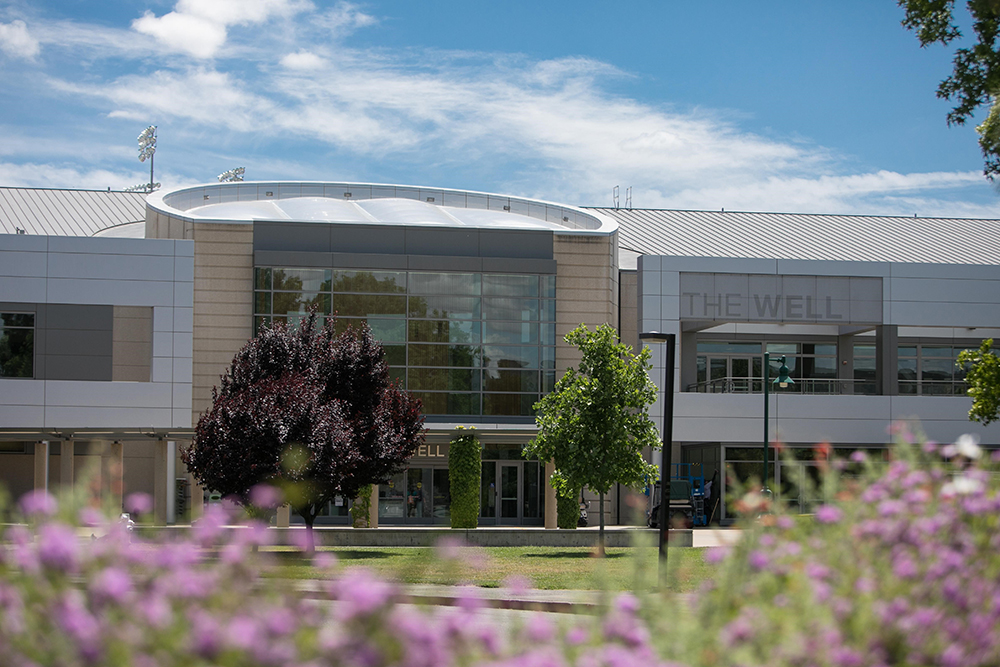 Free showers at The WELL are one example of basic services Sac State is providing for students in unsettled housing situations as uncertainty caused by COVID-19 permeates so many areas of life. (Sacramento State/Andrea Price)
Free showers at The WELL are one example of basic services Sac State is providing for students in unsettled housing situations as uncertainty caused by COVID-19 permeates so many areas of life. (Sacramento State/Andrea Price)
By Cynthia Hubert
Sacramento State is bracing for a surge in students facing economic hardship as the coronavirus continues to take a toll on jobs and lives.
Danielle Muñoz, director of the Sac State CARES office, said the University is offering support and advice to students who are homeless or at risk of becoming so because of the widening effects of COVID-19 on the economy.
At least 10 percent of Sac State students reported in a recent study that they were without stable housing at some point during the past year. The numbers are expected to rise as businesses close or reduce staff in an effort to contain spread of the virus, Muñoz said.
Related story: During crisis, Sac State offers students laptops, other help
“We have students sleeping in their cars, couch surfing with friends or family members, staying in dwellings that are not meant to be lived in such as storage facilities,” she said. “My heart just breaks for homeless students, especially right now.”
CARES and other parts of the campus community are offering help, and more assistance could be coming in the near future, she said.
The WELL is offering free showers to homeless students who sign up for the service online. To limit physical contact in the health facility, a maximum of 20 slots will be available from 8 a.m. to 10:30 a.m. on Mondays, Wednesdays and Fridays.
Students can reserve slots by filling out a form online.
The CARES office, which is open online Monday through Friday, is keeping students up to date on resources that are available across the Sacramento area for people who need help with housing, bills, food and other needs.
Students who are enrolled in at least 12 units and have a 2.0 GPA can apply for emergency funds through CARES to cover food and toiletries. Emergency housing slots at Sac State are currently unavailable, Muñoz said, but the city of Sacramento soon plans to open hotel rooms to people who need shelter. CARES will provide the latest information to students who have questions, Muñoz said.
Updates are posted on the CARES website.
Among other things, students can find information about where to apply for unemployment benefits and CalFresh food aid.
“We haven’t had a lot of homeless students come to us yet,” Muñoz said. “But we are expecting to see a wave as businesses start laying people off and cutting hours.”
Muñoz pointed out that Sacramento County has placed a moratorium on evictions for people who are unable to pay rent as a result of lost income from the COVID-19 crisis. Renters who are sick with the virus or are caring for family members who are ill from it are eligible, along with people who were laid off or whose income was reduced because of the illness.
Students who fear they will be unable to pay rent on time should notify their landlords in writing before rent is due, explaining why they cannot make a full payment. They must provide landlords with documentation to support their reason, and should pay whatever amount of rent that they are able, according to the county ordinance. Rent can be deferred for several months. Landlords who violate the ordinance can face fines of up to $25,000.
“The best use of our voice at CARES right now is to make sure that students who are at risk of becoming homeless are protected,” Muñoz said. “We want people to actually avoid homelessness.”
In part because they are without reliable sources of bathrooms, toiletries and other items considered essential to staving off the virus, homeless people are among the populations most vulnerable to contracting COVID-19, authorities have said.
Two Sacramento State staffers, married couple Don and Dawn Nahhas, have for years been filling backpacks with basic supplies and handing them out to homeless people on Sacramento’s streets. Their nonprofit organization, Josh’s Heart, is named after their late son.
With the help of Sac State students and other staffers, they recently filled dozens of backpacks with items including hand sanitizer, soap and lotion. They plan to deliver their latest supply of “Blessing Backpacks” as soon as it is feasible given “shelter in place” restrictions, they said.
“We want to show those on the street that they matter and are cared for, no matter what they have done that brought them there,” said Dawn Nahhas. “Their current situation does not define them.”
